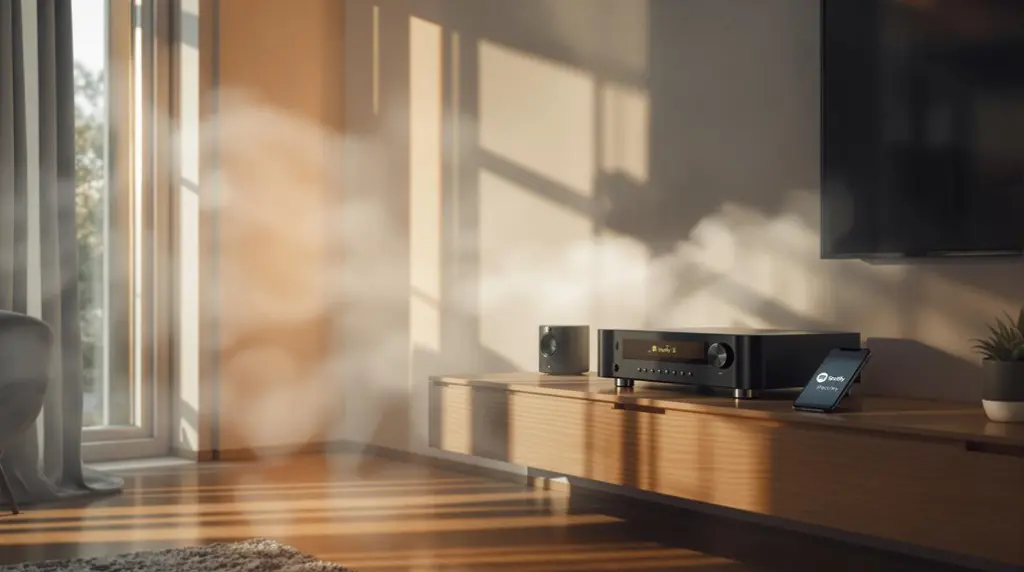To secure your DJ music library, start by using cloud storage solutions like Google Drive or Dropbox for flexibility and remote access. Additionally, invest in a reliable external hard drive, scheduling regular backups to minimize data loss. Don’t overlook portable options such as high-capacity USB 3.0 drives and SD cards, ideal for quick access during performances. Consider a Network Attached Storage (NAS) with RAID configurations for centralized and consistently accessible backups. Enhance this setup with automated backup software, ensuring continuous protection without manual effort. These methods not only safeguard your tracks but also streamline your setup, keeping you prepared for any gig. More insights await as you implement these strategies.
Key Takeaways
- Utilize cloud storage solutions like Google Drive or Dropbox for remote access and continuous synchronization.
- Invest in a high-capacity external hard drive for regular, durable backups.
- Implement RAID-configured NAS for centralized, accessible, and protected storage.
- Use automated backup software such as Backblaze to schedule and encrypt backups.
- Employ dedicated DJ tools like rekordcloud to manage and optimize your music library.
Utilizing Cloud Storage Solutions
To effectively safeguard your DJ music library, consider leveraging cloud storage solutions that provide secure, accessible, and encrypted online backup options. These services, like Google Drive, Dropbox, and OneDrive, are engineered to make sure that your music files aren’t only safe from physical damage but also protected against unauthorized access through robust data encryption technologies.
Data encryption transforms your valuable music files into a secure format that’s unreadable to anyone without the decryption key, typically known only to you and the cloud service. This level of security is important, especially when you think about the potential risks of cyber threats and data breaches. Additionally, the ability to access your music library remotely from any device with internet connectivity enhances your flexibility and preparedness to perform, regardless of your location.
Setting up cloud storage involves selecting a provider that aligns with your storage needs and security preferences. Once chosen, you’ll upload your music files to the cloud server, where they’re stored and continuously backed up. This ongoing synchronization ensures that even the latest additions to your library are immediately secured, providing you peace of mind and more time to focus on your music rather than worrying about potential data loss.
External Hard Drive Backups
When selecting an external hard drive for backing up your DJ music library, it’s essential to choose a reliable model known for durability and longevity.
You’ll need to establish a regular backup schedule that guarantees your music files are copied frequently, minimizing the risk of data loss from sudden failures or accidents.
This systematic approach not only safeguards your music but also provides peace of mind, knowing your library is secure and up-to-date.
Choosing a Reliable Drive
As you choose an external hard drive for your DJ music backups, opt for a high-capacity model that supports fast data transfer technologies like USB 3.0 or Thunderbolt, guaranteeing efficient and rapid backups of your expanding music library.
Here’s how you can select the best drive:
- Drive Compatibility: Verify the drive is compatible with both your operating system and DJ software. This ensures seamless access and restoration of your music files.
- Data Encryption: Look for drives offering hardware encryption. This safeguards your music files against unauthorized access, keeping your library safe.
- Durability: Choose a drive that’s rugged and shock-resistant. This shields your data from physical damage during travel or unexpected impacts, ensuring your music is always ready when you are.
Regular Backup Schedules
Setting up a regular backup schedule for your DJ music library on external hard drives guarantees that your collection stays secure and easily accessible. It’s important to establish a backup frequency that aligns with how often you update your library. Regularly verify that your backups are complete and intact to make sure effective disaster recovery.
| Aspect | Details |
|---|---|
| Backup Frequency | Weekly for active projects, monthly otherwise |
| Data Organization | Categorize by genre, date, or event |
| Disaster Recovery | Store drives in different locations |
Adhering to these practices not only protects your music from unforeseen events but also keeps your content well-organized, making it easier to navigate and use when you need it most.
USB and SD Card Strategies
To guarantee your DJ performances are uninterrupted, adopt a strategy of using high-capacity USB 3.0 drives and SD cards, each with at least 1TB of storage for swift access and efficient space management. These storage solutions not only offer ample space but also make certain that your music library is portable and readily accessible wherever your gigs may take you.
Here are the steps to effectively use USB and SD cards for your DJ music library:
- File Organization: Organize your tracks by genre, BPM, or specific events. This method allows you to quickly find the right music for any moment. Consider creating separate folders or partitions for different types of events or sets, which will streamline your performance setup.
- Redundancy: Always keep at least two backup copies of your music library on different USB drives. This redundancy safeguards against data loss in case one of your drives fails during a gig.
- Physical Labeling and Protection: Clearly label each USB drive and SD card with its contents. Use waterproof and fireproof storage options to shield your music library from physical damage.
Implementing these strategies ensures that you’re prepared for any situation, keeping your performances smooth and your music safe.
Network Attached Storage (NAS)
For DJs requiring centralized and easily accessible storage for their extensive music libraries, Network Attached Storage (NAS) offers a robust solution. NAS allows you to connect multiple devices over a network, enabling easy access to your files from any connected location. This setup is particularly beneficial if you’re collaborating with other DJs or need remote access to your tracks.
One of the key NAS benefits is its support for RAID configurations, which enhance data protection by duplicating your files across multiple drives. This redundancy ensures that, in the event of a hardware failure, your music library remains intact and readily recoverable. Additionally, NAS systems can handle automatic backups and synchronization, guaranteeing your library is consistently updated across all devices.
However, there are drawbacks to take into account. Setting up a NAS can be complex, requiring a good understanding of network configurations and storage management. To mitigate these challenges, start by choosing a NAS with a user-friendly interface. Ensure it supports RAID configurations that suit your needs—RAID 1 or 5 are typically recommended for a balance of redundancy and storage efficiency. Finally, regularly test your setup to make sure that you can quickly recover data when needed, keeping your music library safe and sound.
Setting Up Automated Backup Software
When setting up automated backup software for your DJ music library, it’s important to choose reliable software such as Backblaze, Carbonite, or CrashPlan. These programs guarantee that your data is continuously protected by scheduling regular, automatic backups without your constant oversight.
This systematic approach not only saves you time but also greatly reduces the risk of data loss due to human error or hardware failures.
Selecting Reliable Software
Choosing the right automated backup software, such as Backblaze, Carbonite, or CrashPlan, allows you to schedule regular, secure backups of your DJ music library, minimizing the risk of data loss. These platforms safeguard your data with robust features:
- Data Encryption: Each service offers powerful encryption methods to keep your files secure during transfer and while stored online.
- Online Storage: Your music files are stored in secure, remote data centers, providing protection against local hardware failures or disasters.
- Version Control: They maintain different versions of your files, which can be essential if you need to recover data from a specific point in time.
Scheduling Regular Backups
To guarantee your DJ music library remains safe and up-to-date, you’ll need to set up automated backup software to schedule regular backups. Start by selecting a software that offers backup automation and set it to perform backups at specific times, such as late at night or early in the morning when you’re least likely to be using your system.
This practice not only secures consistency but also enhances data redundancy, safeguarding your files against potential data loss. Make sure the software is configured to automatically save copies to multiple locations—perhaps one on a physical external drive and another in cloud storage.
This dual approach reduces the risk of losing your valuable music collection and maintains its integrity without requiring constant manual intervention.
Leveraging Dedicated DJ Backup Tools
Leveraging dedicated DJ backup tools like Mixed In Key’s Platinum Notes and rekordcloud, you can efficiently organize and enhance your music library while guaranteeing its safety. These tools are designed specifically for DJs to streamline their music management processes, offering both backup solutions and quality improvements.
Here’s how these tools can transform your DJ music library:
- Music File Analysis and Metadata Optimization
- Use Platinum Notes and rekordcloud to scan your music files, detecting any issues with metadata that could disrupt your set. They systematically correct these errors, making sure each track’s information is accurate and complete.
- Audio Quality Enhancement
- Platinum Notes excels in refining the sound quality of your tracks. It adjusts volumes, improves dynamics, and ensures consistent playback quality across all your music files, leading to a more professional sound in your performances.
- Workflow Improvement
- By automating routine tasks such as file analysis and metadata correction, these tools free up your time, allowing you to focus more on creative aspects of DJing like mixing and playlist selection. The result is a more efficient workflow and a better-organized music library.
Adopt these tools to guarantee your music library isn’t only backed up but also primed for perfect performance.
Frequently Asked Questions
How Do I Backup My DJ Library?
To back up your DJ library, use external HDDs for local storage and cloud synchronization for remote access. Regularly update both to safeguard your music. Organize files clearly to streamline this process.
What Is the Best Way to Organize DJ Music Library?
To best organize your DJ music library, sort tracks by genre and create themed playlists. This systematic approach guarantees quick access and smooth shifts between songs during your performances.
What Is the Best Music Library Manager for Djs?
For you as a DJ, the best music library manager is Serato DJ, excelling in software comparison and feature evaluation, with its intuitive interface, smart crates, and seamless track integration capabilities.
How Do I Back up All My Music?
To back up your music, you’ll need to utilize both cloud synchronization and physical drives. Regularly update your backups, and systematically organize them for easy access and management. Don’t overlook redundancy.
Conclusion
Now that you’re equipped with excellent techniques to back up your DJ music library, you’re all set to safeguard your tracks.
Utilize cloud storage for accessibility, rely on external hard drives for bulk storage, and don’t overlook USB and SD cards for portability.
Consider a NAS for seamless network access and set up automated software to keep backups current without a hitch.
Leverage dedicated DJ tools to make sure your music is secure and ready for any set.
Stay systematic, stay backed up.




